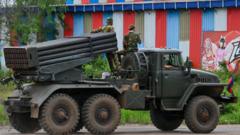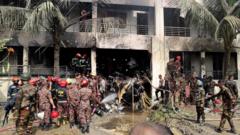In a shocking admission, Benin's authorities confirm the death of 54 soldiers in a recent al-Qaeda-linked attack, the deadliest in the region's escalating conflict. The government vows to continue its fight against jihadist groups, as the stability of West Africa hangs in the balance.
Benin Faces Grim Reality After 54 Soldiers Killed in Al-Qaeda Attack

Benin Faces Grim Reality After 54 Soldiers Killed in Al-Qaeda Attack
Benin's government reveals a staggering rise in soldier fatalities due to jihadist attacks, marking a turning point in the nation's struggle against terrorism.
Benin's government has confirmed that a devastating attack by suspected jihadists last week resulted in the deaths of 54 soldiers, a significant increase from the previously reported toll of eight. This attack, which occurred in the northern region near the borders of Burkina Faso and Niger, is the most lethal incident since armed groups began their incursion into northern Benin earlier this decade.
The al-Qaeda-linked group, Jama'at Nusrat al-Islam wal Muslimeen (JNIM), has claimed responsibility, stating that it killed 70 soldiers in assaults on two military posts. This extremist faction, originally based in Mali, has broadened its operational scope, posing an escalating threat to Benin and its neighbors.
The rise of jihadist violence in West Africa’s Sahel region, particularly affecting countries like Mali, Niger, and Burkina Faso, has also begun to encroach on Benin and Togo, regions that previously enjoyed relative stability. Presidential spokesman Serge Nonvignon referred to the fatalities as “heavy losses for the nation” in a recent social media post.
As the security landscape becomes increasingly perilous, Wilfried Leandre Houngbedji, another government spokesperson, assured the public of Benin's resolve to continue combatting the jihadist threat. "We won't give in... I can assure you that sooner or later, we will win," he proclaimed, underscoring the government's commitment to restore stability amid growing concerns over the spread of jihadist ideology in the region.
The situation calls for urgent attention from both national and international actors as the Sahel grapples with a complex network of fundamentalist movements that continue to undermine efforts for peace and security.




















